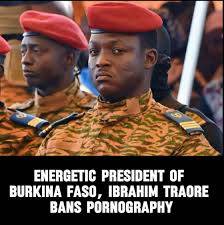Burkina Faso Bans Pornography as Part of Moral Reforms
In a significant move towards implementing moral reforms, the government of Burkina Faso has recently passed a comprehensive ban on pornography. This step, part of a wider initiative aimed at reshaping cultural values and promoting what authorities term “moral responsibility,†underscores the country's broader approach to safeguarding societal norms and reducing exposure to materials deemed harmful, especially for younger generations.
Reasons Behind the Ban
The decision to ban pornography reflects growing concerns within Burkina Faso's government about the impact of explicit content on both the moral fiber of society and the mental health of its citizens, particularly the youth. Officials have pointed to a rise in consumption of explicit material as a factor contributing to a broader breakdown in traditional values, including respect for family life and personal discipline. Proponents argue that easy access to pornography has led to an increase in various social problems, including addiction, behavioral issues, and a perceived erosion of cultural values.
Minister of Information and Communication, Rimtalba Jean Emmanuel Ouédraogo, stated in a public address that the ban is part of the government’s commitment to “protect the moral integrity of the Burkinabe people,†especially young people who are seen as highly vulnerable to the influence of explicit media. Ouédraogo also noted that pornography is often linked to unhealthy expectations and attitudes toward relationships and sexuality, which the government hopes to curb by restricting access to such materials.
Implementation and Enforcement Challenges
Though the government has laid out the legislative framework to enforce the ban, implementing it effectively may prove challenging in practice. With the internet widely accessible and difficult to control completely, especially in urban areas, enforcing the ban may require significant resources. The authorities have stated that they will work closely with internet service providers to block access to explicit sites, alongside launching awareness campaigns to inform the public about the ban and its intent. However, some experts argue that tech-savvy users, particularly younger ones, may still find ways around these restrictions through VPNs and other privacy tools.
Authorities in Burkina Faso are also taking steps to enforce the ban in physical spaces. Public establishments such as internet cafes and other areas where internet access is commonly available will face penalties if they fail to comply with the new regulations. Fines and potential business suspensions are among the consequences for failing to adhere to the ban, and authorities have said they will carry out regular checks to ensure compliance.
Public Reaction and Criticism
The public reaction to the pornography ban has been mixed, with a portion of society in favor of the moral reforms and others skeptical about their impact. Supporters of the ban argue that it will reduce exposure to content that could distort healthy development and personal growth, particularly for children and adolescents. They see the ban as an important step in reinforcing family values and promoting respect for the community's moral standards.
Critics, however, argue that the ban raises questions about individual freedoms and government overreach, pointing to the difficulty of enforcing such a restriction in a digital age. There is also concern that the move could lead to a slippery slope, with the government imposing increasingly strict controls on other forms of media and personal expression under the guise of protecting morality.
The Bigger Picture: Burkina Faso’s Moral Reforms
The ban on pornography is part of a larger framework of moral reforms that Burkina Faso's government has been promoting, aiming to revive traditional values and curb the influence of modern media on the nation's youth. This includes efforts to revise the school curriculum, restrict certain types of content in public broadcasting, and promote what officials describe as a “healthy, value-driven society.â€
Burkina Faso’s decision to ban pornography signals its commitment to preserving traditional values, although the effectiveness and broader consequences of the ban remain to be seen. The debate surrounding this measure also reflects a common challenge faced by governments around the world: how to balance cultural preservation and public morality with the realities of a globalized, internet-connected society.



No comments yet
Be the first to share your thoughts!